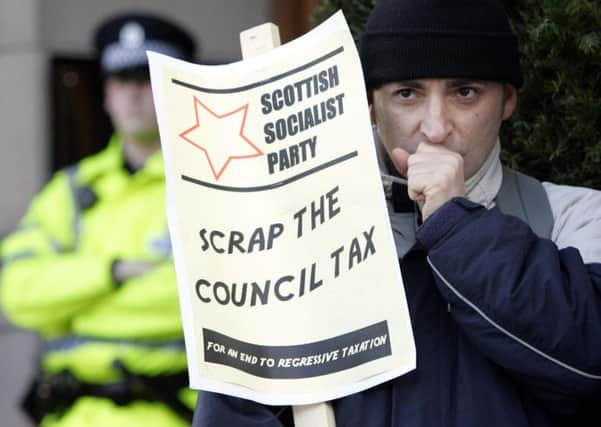MSPs request independent council tax commission


MSPs on the Local Government and Regeneration Committee want to see such a commission set up in time for an new way of councils raising funds to be identified ahead of the 2017 local authority elections.
The committee made the plea in a new report, which called for councils to be handed increased powers but also said authorities should consider devolving more power down to community level.
Advertisement
Hide AdAdvertisement
Hide AdConvener Kevin Stewart said: “In order for communities to be truly empowered they must have the confidence that decisions are taken at the level where their needs are best understood.
“For this to happen, many more functions of local government must be devolved downward and there needs to be a greater willingness in local government to do this.”
He added: “Finance is always a key factor and that is why we have suggested that after the referendum a cross-party commission should be established, with a view to a new system being identified before the next council elections in 2017.”
The committee report pointed out that while political parties agreed there was a need for financial reform, “no one party has yet brought forward ideas as to how this should be undertaken or what a replacement for council tax should be”.
The MSPs added: “We make a clear recommendation this issue must be addressed at the earliest opportunity involving all political parties.
‘Independent cross party commission’
“Steps should be taken within the lifetime of this Parliament to initiate an agreed approach to facilitate meaningful debate on alternative approaches with the aim of having a new system identified in time for the next local government elections in 2017.”
The report said that “given the desirability of reaching consensus” this work should be done by “an independent cross-party commission which should include representatives from local government and wider civic society across Scotland”.
The committee also recommended councils should have powers to raise money locally.
Advertisement
Hide AdAdvertisement
Hide AdWhile the Scottish Government has worked with councils to freeze the council tax, the MSPs said: “We consider existing restrictions imposed centrally should be relaxed allowing local authorities to determine what is appropriate for local circumstances and what will further support local ambitions. We consider there should be a range of taxes or charges from which they should be free to choose to levy to meet local circumstances and needs.”
‘a desirable adjunct of the exercise of democracy’
The report accepted this would lead to differences across the country, but said this would be “a desirable adjunct of the exercise of democracy” adding that it “would then be for locally elected politicians to be held to account by their electorate”.
The MSPs said that there was “no identifiable case for increasing” Scotland’s 32 local authorities, adding: “We are not convinced of the need for structural reform of this type.”
But they went on to urge councils to “draw up schemes to have power exercised at the lowest appropriate level in all areas” to bodies such as community councils, residents associations, tenants associations or other community groups.
The report also said that the control of councils by central government - or the perception of this - must be tackled, stating: “Unless authorities and communities perceive they have the freedom to make decisions without control being exercised at a higher level there will always be a resistance to innovation, taking risks and delivering localised services to meet differing needs.”
‘matters for local democracy’
They suggested there should be “core services which must be provided by local authorities universally across the country and to agreed basic standards” such as education and social work.
“The agreed basic standards are basic human rights and fall to be specified centrally. Provisions beyond the minimum become matters for local democracy,” the committee said.
“Looking ahead we support the vision of local authorities as enablers as well as providers of services. We are clear local authorities should seek to use their powers better and that greater flexibility is required across local authorities in the policies and practices that are adopted across the country.”
SEE ALSO: